The Hideyo Noguchi Africa Prize 2019 (Medical Services) - PRESS RELEASE -25 April 2019, Japan The Cabinet Office
The Government of Japan has decided to award the Third Hideyo Noguchi Africa Prize to Dr. Jean-Jacques Muyembe-Tamfum (Democratic Republic of the Congo (DRC)) and Dr. Francis Gervase Omaswa (Republic of Uganda).
Medical Services Category
Francis Gervase Omaswa(Republic of Uganda)
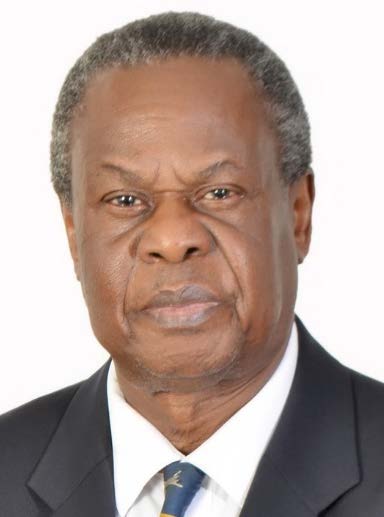 Born in the Republic of Uganda in 1943. Obtained MBChB at University of East Africa, Makerere Medical School, and Master of Medicine in Surgery at Makerere University. Current Executive Director of African Center for Global Health and Social Transformation (ACHEST).
Born in the Republic of Uganda in 1943. Obtained MBChB at University of East Africa, Makerere Medical School, and Master of Medicine in Surgery at Makerere University. Current Executive Director of African Center for Global Health and Social Transformation (ACHEST).
The Third Hideyo Noguchi Africa Prize for Medical Services goes to Dr. Francis Gervase Omaswa for his dedication to addressing the global health workforce (HWF) crisis including education, training, retention and migration of healthcare workers and for building pro-people health and medical systems not only across Africa, but worldwide.
Dr. Francis Gervase Omaswa gave up practicing heart surgery in London to return to Africa starting with the Republic of Kenya and then the Republic of Uganda, building clinical and surgical capacities in his home continent and country. Over the three decades since, Dr. Omaswa has become a world leader in development of international systems for the support, training and efficient utilization of health workforces particularly on the African continent. He led the drafting and convening the First Global Forum on HWF and inspiring the adoption of the Kampala Declaration and Agenda for Global Action that now guides the global response. Dr. Omaswa has brought wisdom to the global stage, serving on the boards of Global Stop TB Partnership, the Global Fund to Fight AIDS, Tuberculosis and Malaria, Independent Review Committee of GAVI – the Vaccine Alliance and as founder and Executive Director of the Global Health Workforce Alliance. Today he leads multiple efforts aimed at creating health systems and workforces that can propel Africa towards realization of the “Health for All” aspirations of the United Nations Sustainable Development Goals (SDGs).
Summary of Achievements
Dr. Omaswa’s contributions are rooted in Africa with tremendous trans-continental and global impact. A graduate of Makerere’s Medical School in his native Uganda, and a bona fide heart surgeon, he became a Fellow of the Royal College of Surgeons of Edinburg, U.K. within a decade, only to return and serve his native land and help develop other leaders on the continent. After producing world class results in open heart surgery in Kenya he and his Anesthesiologist wife Dr. Catherine Omaswa in a selfless pro-poor move took their young family to work in a remote rural Ngora hospital in Uganda to demonstrate how to provide cost effective quality health care to rural populations for five years. Lessons from this experience sharpened his commitment to people centered health care and some are in use in the region. This led him to launch the College of Surgeons of East Central and Southern Africa (COSECSA) as founding President that trains specialists outside capital cities which is now the largest professional surgical college in Africa. He then returned to Makerere University, Kampala and founded the Uganda Heart Institute. He was Director General of Health Services in the Ministry of Health, Uganda, during a crucial period in the fight against AIDS. This was the time when Uganda was leading on both the prevention and treatment frontiers with recognition of vanguard institutions such as The AIDS Support Organization (TASO) and the Joint Clinical Research Center (JCRC). Less well known but perhaps even more important are the pioneering systems strengthening reforms Dr. Omaswa led in his Director General capacity related to decentralization, community health teams, abolition of user-fees, and sector-wide approaches. Dr. Omaswa was Donor Coordinator in the Health Sector at the time the U.S. launched the U.S. President’s Emergency Plan for AIDS Relief (PEPFAR), which made Uganda its largest recipient; he also became Chair of the Portfolio and Procurement Committee of the newly established Global Fund, and Chair of the Independent Review Board of GAVI. Inspired by leadership from President Museveni, the prevalence of HIV infection was cut to one third and Uganda became a role model for many other countries; under-five child mortality rates were also cut by half and continue to decline. And the strong primary health system he helped develop has been reducing the number, size and impact of hemorrhagic fever outbreaks due to Ebola and most recently Marburg viruses. Indeed, Uganda’s depth of expertise and experience in managing the front lines of pandemics was visible first hand in the mobilization of personnel from Uganda to assist in the Ebola crisis that gripped West Africa in 2014/2015. Dr. Omaswa’s contribution to these health services accomplishments is primarily through his extraordinary ability as a teacher, mentor, colleague and friend who nurtures leadership potential everywhere he goes.
While the bulk of Dr. Omaswa’s endeavors have focused on his home continent of Africa, his leadership has extended into the global health arena on multiple fronts to advance the health of Africans and people all over the world. He was a key contributor to the development of the very successful Global Stop TB Partnership and was elected as the founding Chair of the STB Coordinating Board in 2001. He was one of the architects of the Global Fund to Fight Aids TB and Malaria (GFATM) and served as the Chair of its Portfolio Management and Procurement Committee. Dr. Omaswa contributed to the drafting of the Abuja Declaration on HIV/AIDS and related Infectious Diseases – a visionary policy that foresaw the future of international development assistance being more strongly linked to catalyzing domestic resource mobilization moving away from a legacy of dependency on donor handouts. As a result, the African Union appointed him as one of the consultants who drew up the Monitoring Guidelines for African Governments and the lead consultant who developed the African Union HIV Strategy.
In 2005, WHO Director General, JW Lee, invited Dr. Omaswa to serve as a Special Advisor with a special focus on the health workforce. Alongside the development the World Health Report 2006 on Human Resources for Health (HRH), Dr. Omaswa coordinated the consultations and strategic planning that led to the creation of the Global Health Workforce Alliance of which he became the founding Executive Director. In this role, he convened the first ever Global Forum on Human Resources for Health in Kampala, March 2008. With Africa accounting for more than half the countries with critical health worker shortages, Dr. Omaswa brought unmatched experience and commitment to drive the global agenda in this crucial component of health systems. He drafted and steered the Forum to adopt the Kampala Declaration and Agenda for Global Action that now guides the global community in responding to the global crisis in human resources for health. There was no going back: HRH was the tip of the spear in an unprecedented rethinking of our approach to global health, prioritizing health systems and making them more visible and humanized, as recognized at the Hokkaido-Toyako Summit of the G8 in 2008. This new focus, and the concomitant attention to health financing and information systems to ensure access for all to appropriate health services, proved foundational to the successful policy movement for Universal Health Coverage (UHC). The champions of this global movement, have attested to the foundational importance of Dr. Omaswa’s contributions to the great success of this agenda.
Dr. Omaswa returned to Africa from Geneva but he would not think about retirement while more lives could be saved in the continent. He became Chancellor of Busitema University in Uganda and, with support from the Rockefeller Foundation and Norwegian Agency for Development Cooperation (NORAD), Dr. Omaswa created and has led ACHEST, the African Centre for Global Health and Social Transformation. ACHEST has become a regional platform for much needed capacity building and policy guidance in Health Systems Strengthening, the African hub of the global THINK SDG and the Secretariat and Chair of the African Health Systems Governance Network which convenes over 30 institutions in Africa supporting Ministerial Leadership Capacity. Dr. Omaswa’s Handbook for Ministers of Health is a must-read for new ministers and a superb source for policy wonks. Faithful to his first love, Dr. Omaswa continues to serve as Secretariat and Chair of the African Platform for HRH, which was instrumental in the adoption by the World Health Assembly on the Code on the International Recruitment of Health Personnel and subsequent accountability reports.
ACHEST served also as the African Coordinating Center of the Medical Education Partnership Initiative (MEPI), provided technical support to 13 Medical Schools in 12 countries resulting in improvement in quality of medical education and increased numbers of trained of doctors in the continent. He guided the transformation of MEPI and Nursing Education Partnership Initiative (NEPI) into the African Forum for Research in Health (AFREHealth) launched in 2017. ACHEST under the Health Systems Advocacy Partnership funded by the Netherlands government is supporting health systems governance and HWF in Kenya, Malawi, Uganda, Tanzania and Zambia.
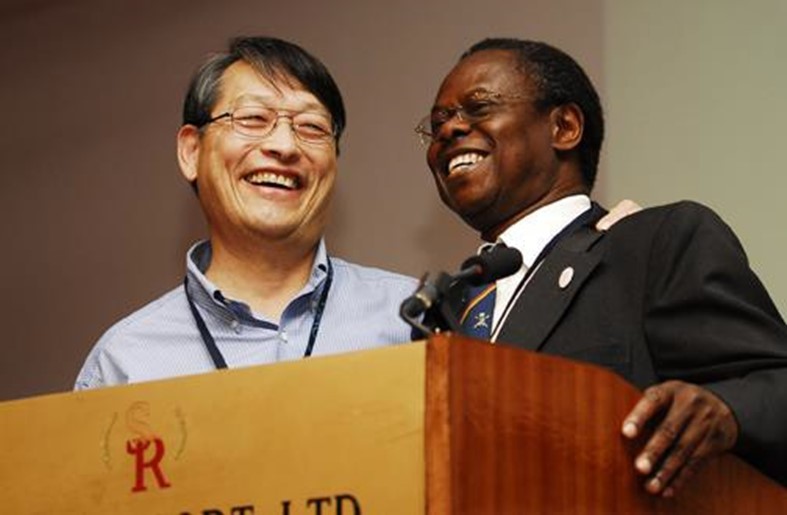
Dr. Francis Omaswa with Lincoln Chen, Board Chair of Global Health Workforce Alliance (GHWA) at the First Global Forum on Human Resources for Health in March 2008, Kampala, Uganda.1,500 Delegates attended this Forum convened by Dr. Francis Omaswa.
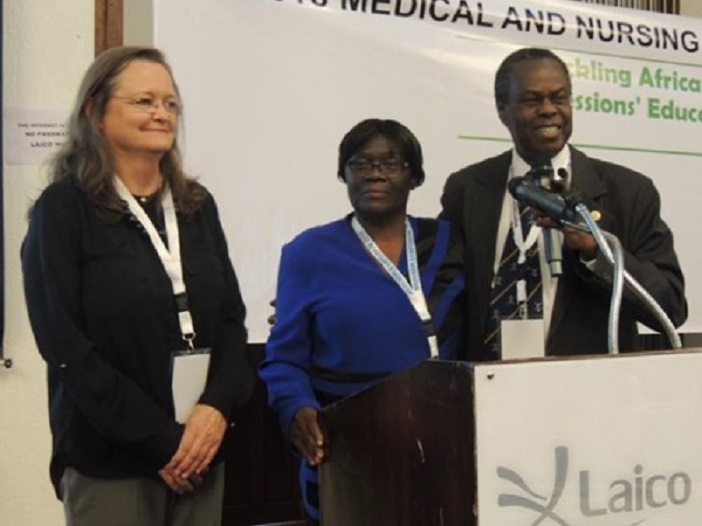
Dr. Francis Omaswa, the President, Marietjie De Villiers and Vice President, Abigail Kazembe of the AFREHealth at the launch in Nairobi, Kenya, August 2017.
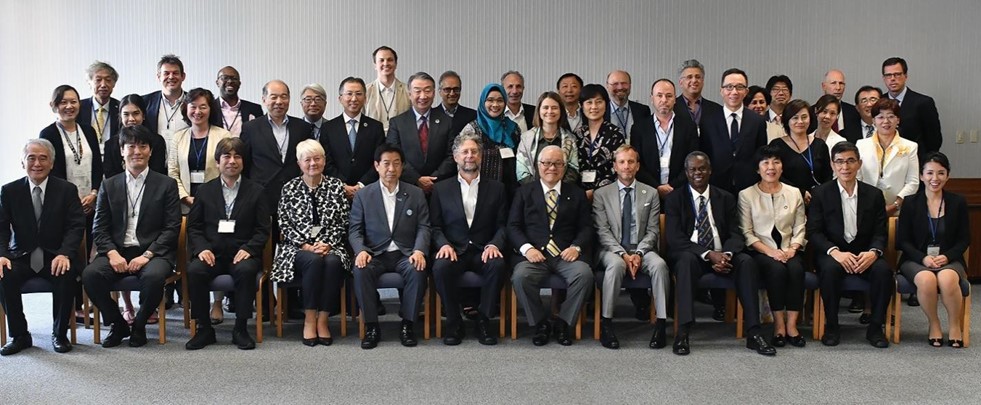
Dr. Francis Omaswa fourth from the right with the International Advisory Group to the government of Japan on Global Health, Japan Center for International Exchange (JCIE), 2018 in Tokyo
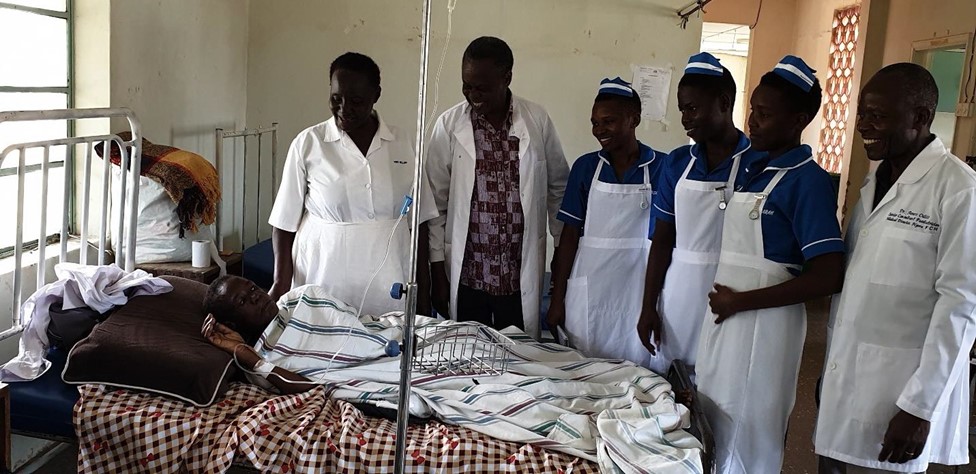
Francis Omaswa seeing a patient along with staff of Ngora Hospital in April 2019
